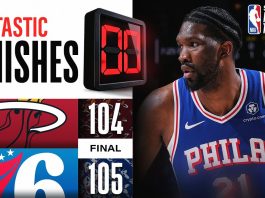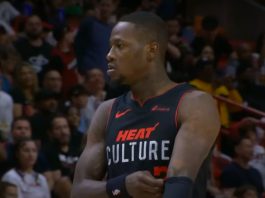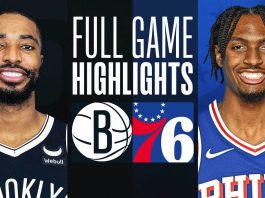In an incredibly revealing interview lasting 90 minutes, legendary coach Larry Brown looks back on his unique career.
On the “Catch & Shoot” podcast, Brown covers a lot of ground — decades of stories, too.
Dean Smith and Frank McGuire, Michael Jordan and Jerry West, Oscar Robertson and Kareem Abdul-Jabbar, Gregg Popovich and R.C. Buford, Bill Russell and Wilt Chamberlain, Donnie Walsh and Doug Moe, Larry Bird and Julius Erving, Rick Barry and Chauncey Billups, Dikembe Mutombo and Eric Snow, Boris Diaw and Raymond Felton, Darko Milicic and Billy King. These are just some of the individuals Brown mentioned in a wide-ranging conversation last week with “Catch & Shoot” hosts Adam Stanco and Noah Coslov.
Brown, now 78, is recovering from his fourth hip surgery. He last worked as FIAT Turin bench boss.
He recently visited Las Vegas to watch the Utah Jazz play in the NBA Summer League.
“I learned a lot,” Brown said on the podcast, “even though I don’t understand the game anymore. It’s a different game, but it was great being around Quin (Snyder) and his staff and watching the players.”
He added: “I’m trying to figure out what to do next.”
Current goals
“What do you want to do next?” he was asked.
“I’d like to do what Tex Winter and Johnny Bach and Pete Carril did — you know, go to some (NBA) team and help young players and maybe young coaches,” the Naismith Memorial basketball Hall of Fame mentor said. “But I think the game has changed so much that I don’t think they’d put a lot of stock in older guys, the value of old coaches, so I don’t really know.
“I get to watch a lot of people that have been important in my life that I coached or played for me, and they invited me, they always invite me to watch them practice and give my ideas, and I’m the one that always learns. I spent two years in Philly watching (Villanova’s) Jay Wright coach, which was an unbelievable experience in a positive way and got to see some other Philly guys, so that was fun. But I just have been with so many great coaches, and I’d kind of like to share what I was taught with some of these young players.”
How the game has changed
Asked what he doesn’t understand about the game anymore, Larry Brown offered this perspective: “Well, I think players are playing too young. If you look around now, the culture of the game, I don’t mind guys coming out like they come out in baseball after high school, you could play tennis or golf when you’re young or be a musician. But basketball is different. Years and years ago, if you look at the benches of NBA teams, they were with veteran players and when the veterans got a chance to play, they were prepared to play and it was all about winning. Now we get these 19-year-old kids and everybody is drafting them based on their athleticism and potential, and I don’t know if they’re all ready. I don’t know if they all understand how to play and I don’t think it’s their fault.
“When you go to college now and you play one year, people put you in a system and they really don’t get a chance to really teach you.
“My first coaching job, I was a freshman coach at North Carolina. You didn’t even play until after your freshman year, and that whole year was spent on fundamentals. Now the young kids go to teams that most of the time the best prospects go to teams with losing records. … And I think they’re put in a real difficult situation and I don’t think it’s their fault.”
He went on: “…It’s a video game now, the 3-point shot, the bad shots, the way the game is refereed now Allen would average 50 and Michael Jordan. You can’t even get near a guy, and it’s really hard to guard. Shot selection is different. This analytics, I trust all the information you can get to me is great, but I was doing analytics when I was 14 years old. I was taught to look at a stat sheet and know what a good shot was and what a bad shot was and the fact that we had to get to the free-throw line a lot, we had to take a high-percentage shot, we had to take care of the ball, we had to guard our own man, we had to get back on defense. We had to make our teammates better — do what we did best.
“Now I think there’s so many analytics that are taking place that people are forgetting what kids are cut inside, what their heart is like. And the greatest quality, I think, is when you’re a coach and you don’t have to beg a guy to play hard. How do you evaluate that? Coaches that have to coach effort usually don’t last long.
“So I don’t know. I admire the ability of guys. When I watch Golden State play, I’m just mesmerized by the way the ball moves and the way each guy makes sacrifices for one another, but not everybody can play like Golden State. They have five guys that can get a rebound and initiate the fast break and they are all willing passers. I don’t see that. I don’t see the ball going inside, and when I was taught to play, if you got the ball inside you had a chance to get fouled, you had a chance to take a high-percentage shot, you had a chance to get an offensive rebound, and the last thing: you had a chance to get back on defense, and transition defense was vital. So I don’t know. It’s just different.”
A lifetime of reflections
A large segment is devoted to Allen Iverson, which provides fascinating reflections on their unique relationship.
One snippet: “Allen, I mean, so many people just loved this guy, and they had reason to because you know the passion of the fans in Philly. When you walk on the court in the arena in Philly and you see what Allen did night in and night out, knowing what he was going through physically, to not love him you had to be really callous, to not appreciate what he was trying to do. And all the players I coached would always ask me about guys like David Robinson, like David Thompson, I would always bring up players that I coached and admired in the qualities that they had…”
Toward the end of the interview, Brown admitted he’s been fortunate to have endless opportunities in the game. “It’s even hard to imagine how lucky I’ve been,” Brown said. “You know, I coached at Kansas, North Carolina, UCLA, SMU. I mean, how many guys get to do that? Start in the (ABA), coach AAU, be involved with so many Olympic teams and on the Olympic team (1964 Tokyo Games). I mean, it’s just remarkable how my life turned out the way it was, because I wanted to be a high school history (teacher) and coach baseball, basketball and football, and all of a sudden, I look back on what I was allowed to do, and it was crazy…”
Show summary
Pure Hoops Media summed up the episode this way on the podcast’s website: “Larry Brown has done more in coaching than almost anyone … ever. He spent a solid 90 minutes with Noah Coslov and Adam Stanco. They talked in depth about his relationship with Allen Iverson, his many coaching stops, Broadway shows, cars, Coach Dean Smith, his history with Gregg Popovich, Rick Barry, and many others. As Coach Brown told the guys, ‘some coaches have a coaching tree, I have a forest.’ His recall of details from 60 years of playing and coaching is remarkable.”






